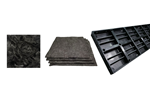Thermolysis, BASF Taiwan present low-emission rCF/TPU materials development
At a Taipei event focused on CO2 emissions reduction, design flexibility and zero-waste solutions, partners promoted recycled carbon fiber (rCF) and polyurethane composite technologies.
Recycled carbon fiber (rCF) nonwoven fabrics jointly developed by BASF and Thermolysis. Source (All Images) | Thermolysis Co. Ltd.
(Taichung City, Taiwan) announces its collaboration with chemicals company (Taipei) jointly advancing the development of recycled carbon fiber-reinforced thermoplastic polyurethane (rCF/TPU) composite materials. Thermolysis highlighted some of these developments in the “#ourplasticsjourney@Taipei event” hosted by BASF Taiwan on Oct. 17.
The event focused on key topics such as reducing CO2 emissions (CO2e reduction), enhancing design flexibility and achieving zero waste through sustainable material solutions. As a participant, Thermolysis showcased its materials and future development directions to major domestic brands, highlighting the potential of collaboration in various industries.
Peter Wu (left), Thermolysis chairman and Phil Chen (right), sales supervisor of BASF Performance Materials at the “#ourplasticsjourney@Taipei event” hosted by BASF Taiwan.
BASF Taiwan presented several rCF/TPU composite materials developed through the combination of its high-toughness TPU with Thermolysis’ rCF and processing technology. These materials included rCF/TPU nonwoven fabrics, injection pellets and sheets. During the event, BASF Taiwan noted that while traditional TPU materials are known for their versatility, the combination of these material innovations “significantly enhances the material’s strength without compromising its flexibility … offering diverse processing methods, meeting the needs of various product applications, with a significant advantage in the sports shoe industry.”
Moving forward, BASF and Thermolysis will continue to develop more sustainable and low-carbon solutions.
Related Content
-
Acciona to build wind blade recycling plant in Spain by 2025
Waste2Fiber facility will use a proprietary thermal method to separate wind blade materials for reuse and will have a processing capacity of 6,000 tons of material/year.
-
Demonstrator project targets circularity solutions in carbon fiber composite sports equipment
The Carbon Fibre Circular Alliance (CFCA) brought together OEMs and technical partners to reclaim short carbon fibers from end-of-life sports equipment, realign into continuous prepreg tapes and remanufacture into new equipment.
-
JEC World 2024 highlights: Glass fiber recycling, biocomposites and more
CW technical editor Hannah Mason discusses trends seen at this year’s JEC World trade show, including sustainability-focused technologies and commitments, the Paris Olympics amongst other topics.



